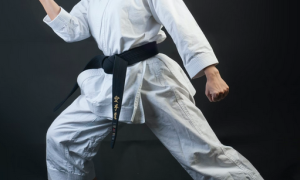
Martial arts like Tai Chi and Karate have exploded in popularity in recent years for their benefits related to self-defense, fitness, and general well-being. With so many styles to choose from, a common question asked is how Tai Chi vs Karate compare and contrast. While both arts promote physical and mental cultivation, they have distinct origins, philosophies, and training methods.
This comprehensive guide will analyze several key factors to understand the core differences between tai chi and karate. We will examine their origins and histories, contrast their training techniques and combat strategies, compare their philosophies, and highlight the pros and cons of each discipline. Additionally, we will answer some frequently asked questions for those deciding between tai chi and karate. By the end, you will have the knowledge to determine which martial art aligns best with your goals and preferences.
Table of Contents
Toggle![]()
Tai Chi vs Karate: Origins and Philosophy
Tai Chi, with its historical roots tracing back to 17th-century China, emerged from the fusion of Taoist and Confucian principles. This martial art places a distinct emphasis on cultivating internal energy, known as Qi, through deliberate and measured movements. The practice is characterized by its slow and meditative sequences, which are designed to harmonize the body and mind. Tai Chi’s philosophy is grounded in principles of balance, relaxation, and the seamless integration of physical and mental aspects. By moving through its graceful postures, practitioners seek not only physical health but also a deeper connection with their inner energy.
In contrast, Karate originated in 19th and 20th century Okinawa when practitioners integrated Chinese martial arts with native Okinawan fighting styles. The samurai bushido code strongly influences karate, instilling values like discipline, respect, and perseverance. Karate philosophy emphasizes self-improvement and personal growth through rigorous training. Practitioners develop dynamic, explosive techniques to generate power and speed for practical self-defense. In contrast to tai chi’s contemplative pace, karate actively focuses on cultivating physical prowess and fighting skills rather than inner cultivation. The origins and outlook of karate revolve around progressing oneself through intense physical and mental development.
Summary:
Tai Chi
- Historical roots in 17th-century China
- Influenced by Taoist and Confucian principles
- Focus on cultivating internal energy (Qi)
- Emphasis on harmony, relaxation, balance, and mind-body connection
Karate
- Developed in 19th and 20th century Okinawa, Japan
- Blended Chinese martial arts with native Okinawan styles
- Strong influence from samurai bushido code
- Core values: discipline, respect, and perseverance
- Reliance on dynamic, explosive movements for self-defense
![]()
Tai Chi vs Karate: Training and Techniques
The training methods and techniques of Tai Chi and Karate provide fascinating insights into their philosophies. Tai Chi’s flowing precision and mindfulness contrast with Karate’s disciplined strikes and blocks. Let’s delve into the approaches that shape these martial arts.
| Tai Chi Training | Karate Training |
|---|---|
| Flowing forms with controlled precision and breathing | Strict adherence to stances, forms, strikes, and blocks |
| Moving meditation for internal strength and mind-body awareness | Precise repetition to perfect individual techniques |
| Emphasis on flexibility and harmony | Kata are pre-arranged patterns of movement |
| Suitable for all ages and fitness levels | Strong emphasis on focus and body control |
| Solo or group practice | Step-by-step progression from beginner to advanced |
| Integration of Qi (internal energy) cultivation | Disciplined practice for precision |
| Mindful application of Tai Chi principles in daily life | Unarmed techniques like punching, kicking, blocking |
Both Tai Chi and Karate have distinct training methods and techniques that reflect their philosophies and intended outcomes. While Tai Chi prioritizes flowing movements and a meditative approach, Karate focuses on intense drills and practical combat applications. These differing approaches cater to practitioners with diverse goals and preferences, offering a well-rounded exploration of martial arts.
![]()
Tai Chi vs Karate: Combat Approach
When it comes to combat application, tai chi and karate differ significantly in their strategies and effectiveness. This table summarizes the key points of contrast:
| Tai Chi | Karate | |
|---|---|---|
| Emphasis | Redirecting opponent’s energy | Overwhelming with strikes |
| Movement | Slow, yielding, push hands | Fast, linear, aggressive |
| Strategy | Technique over strength | Direct attacks |
| Best Suited Against | Untrained attacks | Other trained strikers |
As the table illustrates, tai chi does not focus on overt combat. Its indirect, energy-based approach works best against unskilled opponents or alongside other martial arts. Karate intensely prioritizes practical fighting skills (however this is highly dependent on the Style of Karate) through powerful strikes, combinations, and sparring. This makes karate excel in scenarios against other trained strikers where technical proficiency matters. In summary, karate actively prepares for self-defense and combat sports, while tai chi cultivates meditative, health-based benefits. The two arts contrast strongly in their combat applications, with karate tailored for fighting and tai chi aimed at wellness.
![]()
Tai Chi vs Karate: Key Comparisons
Similarities
- Promote Mental Focus, Discipline, and Lifelong Learning: Both Tai Chi and Karate share a common ground in cultivating mental focus, discipline, and a mindset of continuous learning. Through consistent practice, practitioners of both arts develop not only physical skills but also the mental fortitude to face challenges and refine their techniques.
- Enhance Physical Coordination, Balance, and Injury Prevention: Tai Chi and Karate emphasize the importance of physical coordination and balance. Tai Chi’s deliberate, flowing movements help practitioners fine-tune their proprioception and spatial awareness, while Karate’s dynamic techniques enhance overall body control. The emphasis on proper body mechanics in both arts contributes to injury prevention.
- Suitable for Students of All Ages and Backgrounds: Whether young or old, experienced or novice, Tai Chi and Karate offer inclusive paths for individuals to embark on a journey of self-improvement. Their adaptable training regimens cater to diverse age groups and backgrounds, fostering a sense of community and personal growth.
Differences
- Tai Chi’s Deliberate Pace vs. Karate’s Swiftness: While Tai Chi is characterized by its deliberate and slow-paced movements, Karate emphasizes speed and rapid execution of techniques. This contrast in tempo reflects the distinct goals of each art – relaxation and internal cultivation versus practical combat readiness.
- Soft Power vs. Hard Power: Tai Chi and Karate diverge in the way they harness power. Tai Chi focuses on the development of soft power, utilizing the flow of energy and redirection of force. In contrast, Karate cultivates hard power through the exertion of forceful strikes, kicks, and blocks.
- Meditative Nature vs. Combat Emphasis: Tai Chi’s meditative quality allows practitioners to engage in moving meditation, promoting relaxation and mindfulness. On the other hand, Karate’s primary emphasis lies in combat applications and self-defense techniques, preparing practitioners for real-world situations.
- Health Practice vs. Fighting Method: Tai Chi is often regarded as a holistic health practice with an emphasis on energy cultivation and overall well-being. In contrast, Karate is primarily recognized as a martial art focused on practical fighting skills and self-defense techniques.
Tai Chi vs Karate: Pros and Cons
When weighing the potential benefits of tai chi versus karate, it is useful to compare their respective advantages and disadvantages. This table summarizes the key pros and cons to consider:
| Tai Chi | Karate | |
|---|---|---|
| Pros | – Improved stress management and relaxation – Increased flexibility and mobility – Low-impact, gentle on joints – Accessible for all ages and fitness levels |
– Practical self-defense and fighting skills – Improved athleticism, conditioning, and fitness – Increased discipline, confidence, and mental toughness |
| Cons | – Not effective for real self-defense situations – Health benefits take time and practice to develop – Very challenging for martial applications |
– Higher risk of minor impact injuries like bruises – Can promote aggression if not properly taught – Limited health benefits compared to internal styles |
The table highlights how tai chi excels as a low-impact health practice accessible to all but lacks real martial arts effectiveness. In contrast, karate is an outstanding method for self-defense and combat sport but carries a higher risk of injury and limited wellness benefits compared to tai chi.
![]()
Choosing Between Tai Chi and Karate
When faced with the choice between tai chi and karate, it’s essential to weigh various factors, including your goals, physical capabilities, temperament, and availability. Tai Chi offers a path toward cultivating inner calm and harmony, while Karate focuses on enhancing physical prowess and self-defense skills.
Prospective students are advised to visit schools, observe classes, and engage in conversations with instructors. This informed approach ensures that you align with the martial art that resonates most with your aspirations and personal attributes. Whether you opt for the fluidity of tai chi or the dynamism of karate, both arts present invaluable tools for personal growth and self-improvement through dedicated practice over time.
![]()
FAQ
![]()
Can you use Tai Chi for Self Defense?
Tai chi does contain techniques like joint locks, throws, and strikes that could potentially be applied in self-defense against an unskilled attacker. However, most tai chi practitioners never reach high proficiency in martial applications. For reliable self-defense, a combination of styles such as BJJ and Karate would likely be more effective.
Is Tai Chi Better than Kung Fu?
There is no definitive answer, since tai chi and kung fu represent broad categories rather than specific styles. Tai chi’s focus is more on inner cultivation while kung fu aims to develop functional fighting skills. One art may resonate with a student more than the other depending on their goals and preferences.
Can Tai Chi hold up in a Real Fight?
Against a trained martial artist or skilled fighter, tai chi would generally not be effective in a serious combat scenario. However, tai chi movements can potentially neutralize wild, untrained attacks through redirection and yielding. The health benefits are usually considered much more valuable in tai chi practice.
![]()
Conclusion
Tai chi and karate offer complementary benefits that appeal to different types of students. Tai chi emphasizes inner peace, relaxation, and whole-body health. Karate focuses on discipline, determination, and practical self-defense skills. While their philosophies and methods differ, both martial arts can improve physical coordination, mental focus, and overall well-being with regular practice. Whether you are looking to reduce stress or gain confidence, tai chi and karate provide time-tested tools to help you meet your personal goals.
Also consider checking out our comparison between Ninjutsu and Karate.


